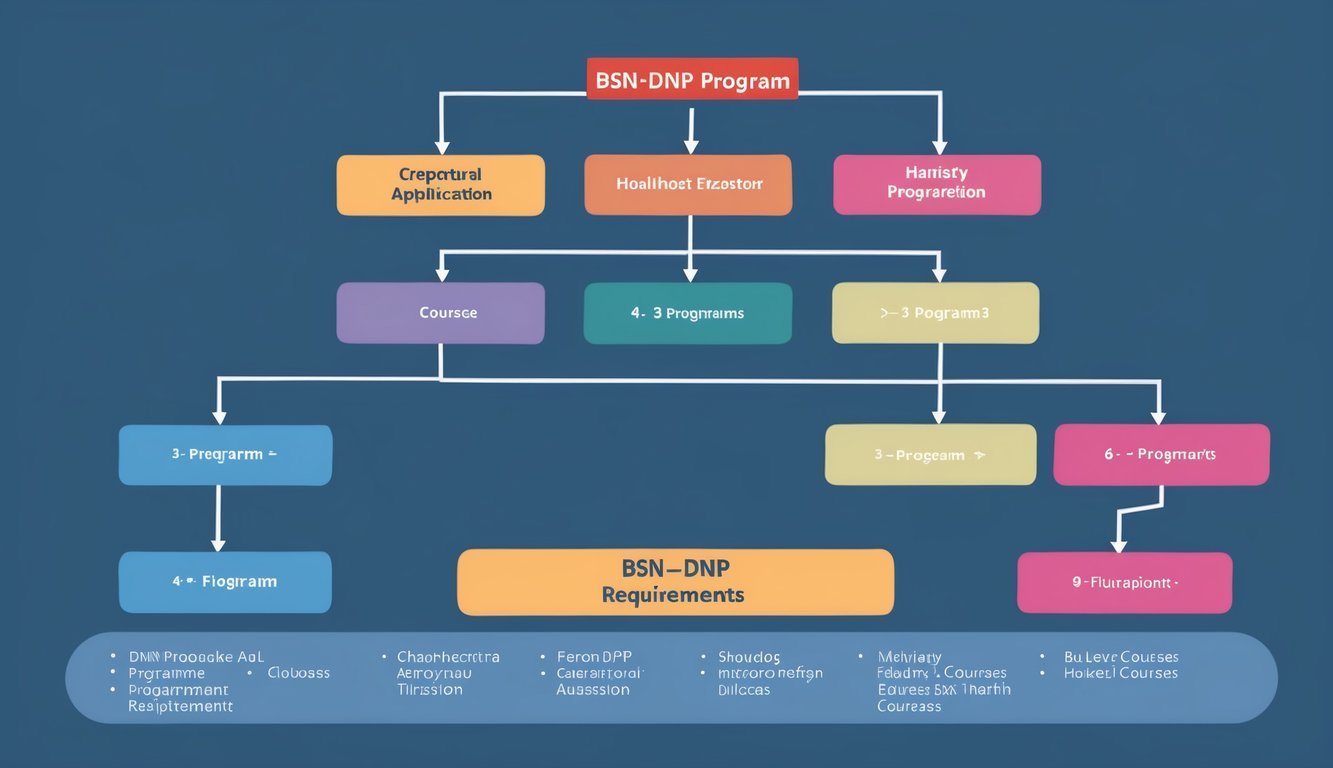If you are a registered nurse looking to advance your career, a BSN to DNP program might be the ideal path for you.
These programs bridge the gap between your Bachelor of Science in Nursing and a Doctor of Nursing Practice, allowing you to take on advanced clinical roles and leadership positions in healthcare. Most RNs can complete most BSN-DNP programs in 2-4 years, making it a feasible option for many.
Choosing the right program involves considering factors such as the duration of study, costs, and specialization options.
Costs for a DNP can vary widely, with some programs exceeding $200K for the full degree.
Understanding these elements will help you make an informed decision about your educational investment.
Explore the Top BSN to DNP Programs to compare your options.
Engaging in a BSN-DNP program not only enhances your qualifications but also prepares you for a significant impact in patient care and healthcare policy.
With the ongoing demand for skilled nursing professionals, pursuing this degree can offer you a competitive edge in the job market.
Visit NursingProcess.org for more insights on the best BSN to DNP programs available today.
Understanding BSN-to-DNP Programs
BSN-to-DNP programs serve as a bridge for registered nurses seeking to elevate their education to the doctoral level.
These programs combine advanced nursing education with the critical skills needed for leadership and practice in healthcare.
Evolution of the DNP Degree
The Doctor of Nursing Practice (DNP) degree emerged in response to the evolving demands of the healthcare system.
Initially, nursing primarily emphasized bachelor’s and master’s degrees.
However, the complexity of patient care prompted the need for advanced practice registered nurses (APRNs) to possess a terminal degree.
DNP programs were officially launched in the early 2000s, emphasizing clinical excellence and systems leadership.
Today, many institutions offer BSN-to-DNP pathways, allowing you to earn a doctoral degree in a relatively short timeframe.
Programs often incorporate evidence-based practice and leadership, preparing you to address current healthcare challenges effectively.
Scope of Advanced Nursing Practice
The scope of practice for DNP-prepared nurses has expanded significantly.
You can engage in direct patient care, healthcare policy development, and administration, enhancing the quality of nursing leadership.
DNP professionals often serve in roles such as nurse practitioners, clinical leaders, and healthcare consultants.
As a graduate of a BSN-to-DNP program, you will be equipped to implement innovative solutions and improve patient outcomes.
Many programs also offer specialization options, such as family or psychiatric-mental health nursing, allowing you to focus on your interests and the needs of your community.
The Importance of a Terminal Degree in Nursing
Holding a terminal degree in nursing, such as the DNP, is increasingly essential in today’s healthcare landscape.
This degree not only signifies advanced knowledge but also enhances your credibility within the profession.
Employers often prefer DNP-prepared candidates for leadership and clinical roles due to the rigorous training involved in their education.
The DNP program emphasizes critical thinking, advanced practice skills, and leadership, preparing you for the complex challenges in healthcare settings.
Pursuing a BSN-to-DNP program positions you at the forefront of nursing practice, enabling you to influence policy, drive innovation, and improve health systems.
Many programs facilitate this journey through flexible online formats, accommodating the busy schedules of working professionals.
For more details, consider exploring options on platforms like Nurse.org and NurseJournal.org.
Admission Criteria and Academic Requirements

When considering a BSN-DNP program, it’s essential to understand the specific admission criteria and academic requirements.
These are designed to ensure that candidates are well-prepared for the rigorous curriculum ahead.
You should pay attention to the prerequisites, GPA standards, and necessary documentation needed for a successful application.
Educational Prerequisites
To apply for a BSN-DNP program, you must possess a Bachelor of Science in Nursing (BSN) from an accredited institution.
Make sure that your undergraduate program is accredited by either ACEN or CCNE, as this is often a mandatory requirement.
Additionally, some programs may require specific coursework in areas such as health assessment, pathophysiology, and nursing ethics.
It’s crucial to review each program’s prerequisite courses on their admission criteria page, such as those at the Florida Atlantic University.
Proficiency Assessments and GPA
Many institutions set a minimum GPA requirement for admission, commonly around 3.0 on a 4.0 scale.
Some programs might allow applicants with a GPA between 2.75 and 2.99, but you’ll need to provide a strong justifiable explanation.
In addition to GPA, some schools may require a Graduate Record Examination (GRE) score as part of the application.
Check the specific requirements of the programs you’re considering to ensure you meet these academic standards.
Documentation for Application
To complete your application, you will need to gather several key documents.
This typically includes:
- Official transcripts from all post-secondary institutions attended
- Letters of recommendation from professional colleagues familiar with your work
- A personal statement outlining your career goals and reasons for pursuing the DNP
Be sure to follow each program’s specific guidelines on documentation submission.
For more detailed criteria, refer to resources like the UNC School of Nursing.
Taking the time to understand these requirements will help you prepare a competitive application.
Program Structure and Curriculum

The structure and curriculum of BSN to DNP programs are designed to comprehensively prepare you for advanced nursing practice.
This involves core subjects, specialized courses, practical clinical experiences, and a focus on research.
Understanding the intricacies will help you make informed decisions about your educational pathway.
Core Subjects and Specializations
Your DNP curriculum typically begins with core subjects that lay the foundation for advanced nursing practice.
These may include courses in advanced health assessment, advanced pharmacology, and population health.
| Core Subjects | Description |
|---|---|
| Advanced Health Assessment | Focuses on gaining a comprehensive understanding of patient evaluations. |
| Advanced Pharmacology | Covers drug interactions, indications, and patient education. |
| Population Health | Emphasizes health disparities and public health initiatives. |
You can then select a specialization based on your career interests, which might include family nursing, pediatrics, or psychiatric care.
Clinical and Didactic Learning
The program emphasizes both clinical and didactic learning to ensure you develop the necessary competencies.
Clinical hours are often a significant component, typically ranging from 1,000 hours to 1,500 hours, depending on your program structure.
Most programs offer a hybrid format combining in-person and online classes.
This approach allows you to engage in hands-on clinical experiences while benefiting from the flexibility of virtual coursework.
You will participate in various clinical settings to apply your knowledge in real-world situations.
This includes working with diverse populations to build your skill set.
Research and Scholarly Project
A pivotal aspect of your DNP program is the DNP scholarly project.
This requires you to identify a clinical problem, conduct thorough research, and implement a solution in practice.
The project typically encapsulates elements such as:
- Literature Review: Examine existing research related to your project.
- Evidence-Based Practice: Use data to inform your decisions and interventions.
Your scholarly project is not just a requirement; it is a chance to contribute to nursing knowledge and improve patient outcomes.
Collaborating with faculty mentors can enhance the quality of your work while providing invaluable guidance throughout the process.
The robust structure of BSN to DNP programs ensures you are well-prepared for advanced nursing roles.
Career Outcomes and Professional Advancement

Pursuing a BSN to DNP program opens various career paths, enhances salary potential, and significantly impacts healthcare quality.
Here are key aspects to consider as you navigate your professional journey following this advanced nursing education.
Career Paths for DNP Graduates
With a Doctor of Nursing Practice (DNP) degree, you can explore diverse roles.
Common career paths include:
- Nurse Practitioner (NP): You may choose to specialize as a Family Nurse Practitioner or a Psychiatric-Mental Health Nurse Practitioner, focusing on patient assessment and treatment.
- Clinical Nurse Specialist: This role involves advancing nursing practices and applying evidence-based approaches within clinical settings.
- Nurse Anesthetist: You could administer anesthesia and provide care during surgical procedures, requiring advanced clinical skills.
- Nurse Midwife: This specialization emphasizes women’s reproductive health and childbirth care.
These roles not only advance your career but also enhance healthcare delivery through specialized expertise.
Salary Expectations and Job Market Trends
DNP graduates enjoy competitive salaries compared to their BSN counterparts.
Salaries vary by role and location, but here is a snapshot of average earnings:
| Role | Average Annual Salary |
|---|---|
| Nurse Practitioner (NP) | $107,000 |
| Clinical Nurse Specialist | $95,000 |
| Nurse Anesthetist | $165,000 |
| Nurse Midwife | $110,000 |
These figures reflect a growing demand for advanced practice nurses, particularly as the healthcare landscape shifts towards holistic and integrated care approaches.
Impact on Healthcare Quality and Patient Care
Holding a DNP enhances your ability to influence health outcomes positively.
DNP graduates are equipped to implement evidence-based practice, which leads to improved patient care protocols.
Your advanced education allows you to take on leadership roles in nursing, where you can:
- Drive quality improvement initiatives.
- Advocate for patient-centered care models.
- Participate in health policy development.
This commitment to excellence not only enriches your nursing career but also significantly contributes to the overall effectiveness of the healthcare system.
Online BSN-to-DNP Programs and Accessibility
Accessibility in Online BSN-to-DNP programs is a crucial consideration for aspiring nurses.
Factors such as program format, clinical placements, and financial support play significant roles in determining whether you can successfully pursue this advanced degree.
Comparing Online and Traditional Program Formats
Online BSN-to-DNP programs offer flexibility that traditional formats often cannot match.
With options to complete coursework at your own pace, you can balance your studies with work or personal commitments.
Advantages of Online Programs:
- Flexibility in Schedule: Access to lectures and materials anytime.
- No Commute: Save time and costs by studying from home.
In contrast, traditional programs may offer more hands-on interaction with faculty and peers but often require strict attendance.
If you prefer a self-directed approach, online programs might be ideal for you.
Clinical Placements and Residencies
Though online programs provide valuable theoretical knowledge, securing clinical placements is a pivotal aspect of your education.
Accredited universities, such as Duke University and the University of Michigan, typically have established partnerships with local healthcare facilities, which can facilitate your clinical experiences.
Key Considerations:
- Local Clinical Sites: Ensure the program has partnerships with facilities near you.
- Residency Requirements: Some programs may require in-person residencies during specific training periods.
You should verify whether you will need to travel to these sites and how often.
Understanding these logistics can influence your decision on the right program for your needs.
Financial Considerations and Support
Affordability is a significant factor when evaluating online BSN-to-DNP programs.
Programs vary widely in cost.
However, options like scholarships and grants are available to help ease the financial burden.
Many accredited universities offer financial aid resources for students.
- Average Tuition: Research tuition rates from institutions. For instance, the University of Pittsburgh might have different fees compared to programs at Emory University.
- Available Financial Aid: Look into grants, scholarships, and loans that can subsidize your education cost.
Maximizing financial aid can also reduce your overall student debt.
This allows you to focus more on your education and less on financial stress.

